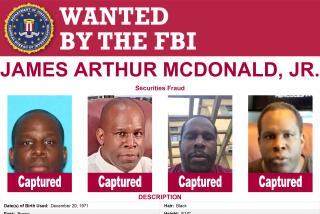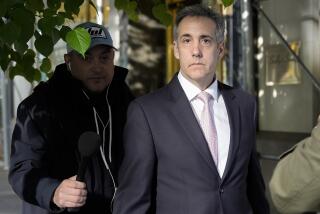Clinton Link Is Alleged in Whitewater Trial
- Share via
LITTLE ROCK, Ark. — As the first trial began in the government’s lengthy Whitewater investigation, the prosecution said Monday that its evidence will link President Clinton to an elaborate, fraudulent financial scheme involving his Whitewater investment partners James B. and Susan McDougal and Arkansas Gov. Jim Guy Tucker.
Ray Jahn, an attorney for the Whitewater independent counsel’s office, outlined for the first time the evidence that has been gathered in the case, which began with allegations against Clinton four years ago, before he was elected to the White House.
The president was not charged, but he has been called as a witness. He is expected to deny knowledge of the transactions involved.
Using elaborate multicolored charts, Jahn sketched out the details of an alleged scheme in which Tucker and the McDougals plotted with the government’s central witness, David Hale, to finance a complex series of business deals improperly using money from two government-backed financial institutions--McDougal’s Madison Guaranty Savings & Loan and Hale’s investment company, Capital Management Services.
Jahn told the jury of four men and eight women that they will hear evidence that Clinton, then governor of Arkansas, persuaded Hale in the mid-1980s to make an improper loan to Susan McDougal that would benefit the Whitewater Development Co. The defense later acknowledged that most of the $300,000 loan in question went to acquire property for the Whitewater project, but the defendants insist the loan was not improper.
Furthermore, lawyers for Tucker and the McDougals argued that Hale concocted the story of Clinton’s involvement in an attempt to escape prosecution. “Those conversations never, ever took place,” said defense attorney Sam Heuer, referring to alleged meetings involving Clinton.
According to Jahn, the defendants conspired together and with others to create a series of bogus real estate transactions that would generate capital on paper to be invested in new ventures or pay off old debts. Specifically, he outlined four major transactions that he said began with a simple agreement in which James McDougal promised Tucker an easy profit--”an offer he couldn’t refuse.”
“These are crimes of the pen instead of crimes of the pistol,” explained Jahn, clearly trying to simplify what is a complex tale of financial intrigue. “This was nearly the perfect crime. . . . Until David Hale came forward in 1993, the crime was not discovered, the crime was not uncovered.”
He said the conspirators were caught because they failed to repay much of the money they borrowed and because both Madison Guaranty and Capital Management Services went bust.
The prosecutor said Susan McDougal obtained $300,000 from Hale by stating that the money would be used to promote a fictitious advertising company, known as Master Marketing. He said she then used it for a variety of other items, including home renovations.
More than half of the $300,000 was used by the McDougals to purchase land from International Paper Co. that became part of the Whitewater resort development. Not only does Clinton deny that he asked Hale to make the loan, but he also insists he knew nothing of the transaction.
Jahn said witnesses--presumably Hale--will testify that Clinton urged Hale to lend the money to Susan McDougal so that the governor’s name would not be listed on the loan documents. No explanation has yet been offered as to why Clinton wanted to avoid having his name on the loan.
The defense portrayed Hale as an experienced criminal who fooled the defendants into thinking he was a serious businessman. They noted that his allegations against the McDougals, Tucker and the Clintons were ignored by the U.S. attorney’s office in Little Rock.
Not until Atty. Gen. Janet Reno appointed an independent counsel to investigate Whitewater in 1993 were the allegations in this case regarded as serious by the government, they said.
Appealing to local pride, Tucker’s lawyer, Buddy Sutton, accused prosecutors from outside Arkansas of trying to dupe a local jury into seeing a conspiracy where there is none. “Do they really think that we fell off the watermelon truck here in Arkansas?” he asked.
More to Read
Inside the business of entertainment
The Wide Shot brings you news, analysis and insights on everything from streaming wars to production — and what it all means for the future.
You may occasionally receive promotional content from the Los Angeles Times.










